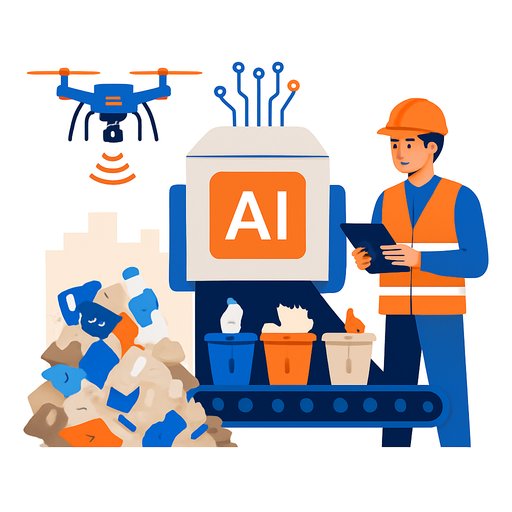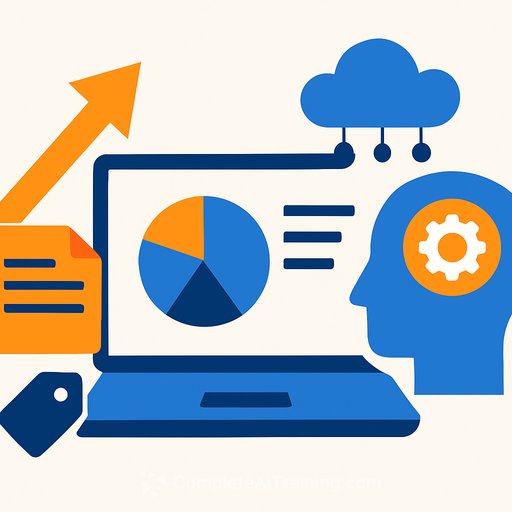When waste meets AI, resources are better managed
AI isn't just for labs or chat interfaces. It's already changing how cities collect, sort, and reuse waste-cutting costs, reducing emissions, and making teams more effective. The playbook is simple: start with data, optimise collection, then improve sorting and recovery.
What leading cities are doing
- Barcelona: Smart bins with sensors track fill levels so trucks only collect when needed-fewer trips, lower CO2, less overtime.
- Seoul: A pay-by-weight model, guided by AI insights, reduces household waste and lifts recycling rates.
- Chennai: Airbin pilots use IoT sensors to alert authorities when bins are full, improving response times.
- Ireland: 3,000+ solar compactors hold up to five times more than standard bins, cutting collections and keeping streets cleaner.
- Asia Pacific: Partnerships use AI to classify and track litter; in Hong Kong, an AI-enabled "Clearbot Neo" identifies and logs trash as it collects from waterways.
The practical path: sense, predict, sort
- Sense: Install sensors to monitor fill levels and contamination signals. Get a baseline of what's produced, where, and when.
- Predict: Use historical patterns to forecast surges (festivals, market days, harvests) and plan crews and routes in advance.
- Sort: Combine AI-assisted sorting with manual labour to improve recovery of plastics, metals, paper, and organics.
Design for constraints, then scale
AI systems can work in low-resource contexts. Use solar-powered bins where electricity is unstable. Where internet is weak, send SMS alerts instead of relying on apps. Start with what you can measure, and expand as savings fund the next phase.
Why management should care
- Operational efficiency: Fewer unnecessary trips, less idle time, smarter crew allocation.
- Financial impact: Fuel and overtime reductions free budget for tech upgrades.
- Compliance and ESG: Better data helps enforce 3R policies and Extended Producer Responsibility (EPR), and produces credible impact reports.
- Service quality: Cleaner streets, fewer complaints, higher recycling yields.
Policy and partnerships that fund the change
EPR can fund smart collection and sorting pilots by making producers responsible for packaging waste. Clear, auditable data makes enforcement workable and attractive to private partners. For a primer on EPR, see the OECD's overview here. For circular economy targets, see the European Commission's policy page here.
Bangladesh: pilots that can start now
- Market-focused organics pilot (city corporation): Sensor bins in wholesale markets, data-driven routes, and scheduled organics recovery. Target: lower daily overflow and methane risk while improving cleanliness.
- Rural cluster pilot (5-10 villages): Solar bins with SMS alerts routed to the upazila office. Simple dashboards track fill levels and pickup times.
- Producer-funded plastics pilot: Under upcoming EPR guidelines, finance AI tools for collection and sorting. Link producer take-back obligations with measurable recovery data.
Bangladesh already has the National 3R Strategy, the Solid Waste Management Rules 2021, e-governance initiatives, and upcoming EPR guidance. The gap is execution: equipment, training, and consistent connectivity. Start small, measure clearly, reinvest savings, and scale through public-private partnerships.
Implementation blueprint (start small, prove value, scale)
- 1) Baseline: Map bins, collection points, routes, and costs. Set KPIs: missed pickups, cost per tonne, fuel per km, complaint rate.
- 2) Pilot design: Choose 1-2 zones with high footfall or high overflow. Deploy sensors, define service levels, and set escalation rules (SMS first, app later).
- 3) Procurement: Specify open APIs, battery life, offline modes, and data ownership. Require dashboards and exportable reports.
- 4) Training and process: Dispatcher routines, driver app usage, MRF sorting protocols, safety standards.
- 5) Compliance and data governance: Link waste data to 3R and EPR reporting. Control access, retention, and audit trails.
- 6) Scale and finance: Use fuel/overtime savings plus EPR and PPP funding to expand sensors and sorting capacity.
KPIs that prove ROI
- Collections per bin per week, and percentage of on-demand vs. scheduled pickups
- Fuel per tonne collected and time per route
- Overflow incidents and complaint rate
- Recovery rate by material (plastics, metals, paper, organics)
- CO2 reduction from avoided trips and improved diversion
- EPR compliance: tonnes recovered vs. producer obligations
Vendor checklist
- Multi-network connectivity (2G/3G/LTE), SMS fallback, and offline buffer
- Battery life and solar options; maintenance schedule and spare parts plan
- Open APIs, data portability, and integration with routing software
- On-site training, SLAs for uptime, and local support capacity
- Total cost of ownership: hardware, software, data, maintenance, and upgrades
Risks to manage
- Data gaps: Start with high-variance areas to get signal fast; audit weekly.
- Workforce impact: Combine AI with manual sorting; upskill teams rather than reducing headcount abruptly.
- Inclusion: Integrate informal waste pickers into sorting and recovery workflows with fair pay and safety.
- Connectivity: Default to SMS and store-and-forward where networks are weak.
Build internal capability
If your team needs practical AI skills for operations, explore curated programs by job role here. Short, applied courses help managers evaluate vendors, read dashboards, and lead pilots with confidence.
Bottom line
Start with sensors, route smarter, then upgrade sorting. Fund pilots through EPR and reinvest savings. Bring policy, data, and operations together-or keep paying for avoidable trips and overflowing bins. The choice is managerial, not technical.
Your membership also unlocks:






